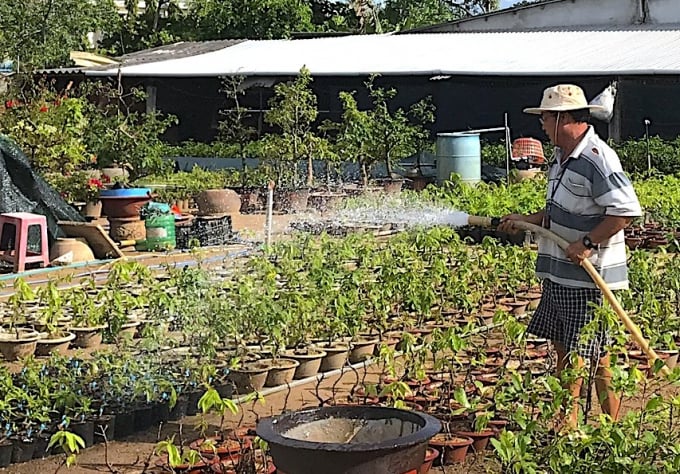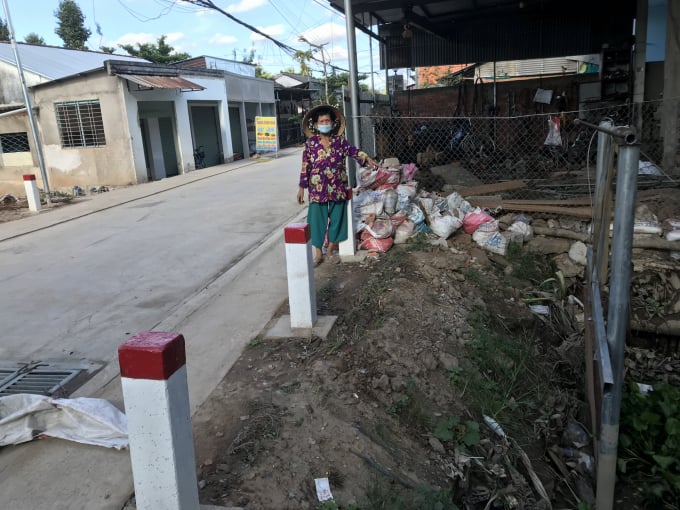June 21, 2025 | 01:23 GMT +7
June 21, 2025 | 01:23 GMT +7
Hotline: 0913.378.918
June 21, 2025 | 01:23 GMT +7
Hotline: 0913.378.918

Cho Lach farmers pool money to build a temporary dam to prevent saltwater intrusion. Photo: Minh Dam.
In addition to actively storing water in ponds, lakes and bags, people in Cho Lach, Ben Tre also "pool money" with local authorities to build temporary dams on canals and canals, effectively creating freshwater reservoirs.
Talking to old farmer Nguyen Quang Truong, who specializes in growing ornamental apricot in Vinh Hung 1 hamlet, he learned that the local authorities and people here have just finished building a temporary dam at Cai Da bridge to counter saltwater. The full moon water rise a few days ago brought some brackish saltwater with salinity of over 1‰. Because the dam was not completed, people had to live with it for a while, but now saltwater can no longer cause any harm to the orchards.
“Thanks to the weather this year and thanks to the government's initiative, the people won’t have to suffer. The dam is funded by the state, and the people contribute some more according to the area of land they have. My house has 1,000 m2, so it’s VND 250,000. That isn’t much compared to the damage in previous seasons. Even if they ask to fund VND 1 million, I will gladly contribute."

Mr. Truong watered ornamental apricot using water stored in the reserved water bag. Photo: Minh Dam.
Regarding this proactiveness, Mr. Tran Huu Nghi, Deputy Director of Cho Lach Agriculture and Rural Development Office, said, “In order to proactively prevent drought - salt, the district has actively mobilized people to build 15 temporary dams under the state program with a budget of only approximately VND 3.5 billion. The district budget has also invested in the construction of five more solid dams. The anti-saltwater dam’s coverage rate is 75% at present.”
Leaving Cho Lach, we went to communes specializing in fruit cultivation in Chau Thanh such as Tan Phu, Tien Thuy, Tien Long, Phu Tuc, and Phu Duc. Mrs. Nguyen Thi Kim Hue, Vice Chairwoman of Tien Thuy People's Committee, led us to visit local farmers.
"Apart from large projects invested by the state, there are also small dams that are self-funded by the people such as Tu Hai temporary dam, Ong Sau Hai canal temporary dam, and Be Mai sluice dam. They even take turns to look after the dams, so the commune has not suffered any damage from saltwater intrusion this time," said Ms. Hue.
Old farmer Pham Van Ghi (often called Hai Ghi), 70 years old, Chief of Chanh hamlet, Tien Thuy commune, shared that people also built dams to prevent unexpected saltwater intrusion in the saltwater season a few months ago. And thanks to the government's public investment project, the Be Mai temporary dam was upgraded into Be Mai sluice. “But this sewer did not have a lid, so the people around gathered VND 6 million more to buy one to cover the sluice. Now the sluice works perfectly in terms of resisting saltwater intrusion.”

The temporary dam built by people has received investment from the government to become Be Mai sluice. Photo: Minh Dam.
Following the 2021 - 2030 Action Plan in response to climate change, Ben Tre province continues to improve the community’s ability to adapt to situations, and strengthen the resilience of ecosystems in face of the negative effects caused by climate change.
"The salinity level this year is higher than last year, but thanks to the initiative of the locality building dams and water storage, people can produce at ease, and the coastal area remains stable. For example the whole field area of Ba Tri and Giong Trom districts and a part of Thanh Phu and Binh Dai districts is now completely closed, so the water is still fresh. People can farm, raise cattle and live normally,” said Mr. Tran Ngoc Tam, Chairman of Ben Tre People's Committee.
Freshwater scarcity in the dry season is not a new story, but the hardship has lessened. The leader of Ben Tre People's Committee said that by the end of 2024, with these construction and non-structural solutions, the locality would no longer lack freshwater for daily life and production.
Translated by Samuel Pham
![Turning wind and rain into action: [9] Digitizing hydrometeorological data in response to climate change](https://t.ex-cdn.com/nongnghiepmoitruong.vn/608w/files/news/2025/06/17/z6704423696987_15fd32ffc26d590d204d520c9dac6786-nongnghiep-165943.jpg)
(VAN) Farmers have begun accessing hydrometeorological applications to adjust their cropping schedules, aiming to ensure productivity and adapt to climate change.
![Turning wind and rain into action: [8] Real-time salinity detection and early warning technology](https://t.ex-cdn.com/nongnghiepmoitruong.vn/608w/files/news/2025/06/17/z6704423696987_15fd32ffc26d590d204d520c9dac6786-nongnghiep-151127.jpg)
(VAN) Thanks to the integration of modern hydrological-hydraulic models, remote sensing technologies, and artificial intelligence, the accuracy of hydrological forecasting has significantly improved.
![Turning wind and rain into action: [7] Early disaster warnings help marine farmers minimize losses](https://t.ex-cdn.com/nongnghiepmoitruong.vn/608w/files/news/2025/06/17/z6704423696987_15fd32ffc26d590d204d520c9dac6786-nongnghiep-142942.jpg)
(VAN) In recent years, thanks to early disaster warnings and forecasting, marine farmers in Khanh Hoa province have been able to reduce risks and losses, thereby improving production efficiency.
![Turning wind and rain into action: [6] ‘Four on-the-spot’ disaster management software](https://t.ex-cdn.com/nongnghiepmoitruong.vn/608w/files/news/2025/06/17/e5a48259d6a262fc3bb3-nongnghiep-183800.jpg)
(VAN) By simply activating the scenario on the disaster management software, the relevant authorities immediately know how many households need to be evacuated, where to evacuate them to, and by what means of transportation…
![Turning wind and rain into action: [5] Hue applies modern technology in disaster forecasting](https://t.ex-cdn.com/nongnghiepmoitruong.vn/608w/files/news/2025/06/17/z6704423696987_15fd32ffc26d590d204d520c9dac6786-nongnghiep-093938.jpg)
(VAN) In Hue city, modern technology has recently been applied in meteorological and hydrological forecasting and warning, helping to reduce the damage caused by natural disasters.

(VAN) A cutting-edge farming technique being implemented on an experimental ranch in Arizona's Sonoran Desert has already saved a billion gallons of water over five years, according to Civil Eats.

(VAN) Poultry and pig production and the environment can be boosted through enhanced water technology, according to new research.